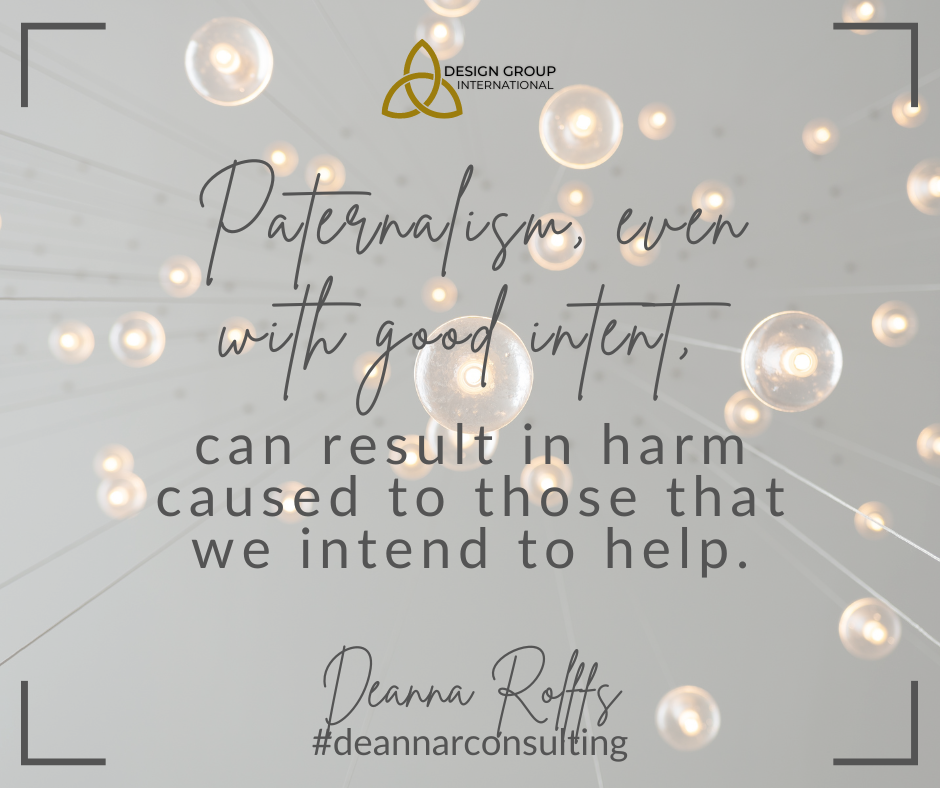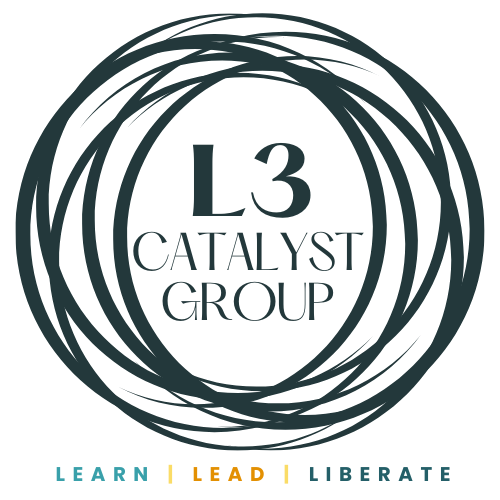Leadership + Paternalism
Illuminating White Supremacy Culture Part 4
Where do you notice people deciding what is best, right, or acceptable for someone else?
When do we distrust those closest to an issue or challenge, presuming that those experiencing an ism, exclusion, or marginalization don't have the agency to solve their challenges?
How do we defer to those in power, presuming they are right, or side with them to survive due to proximity to power?
An example of paternalism
I grew up believing God loved men and boys more than women and girls. Men made decisions serving in power positions such as principals, mayors, hospital administrators, police officers, and community leaders.
Girls and women were enculturated to defer to men in power very early for survival. It was presumed men were most qualified and entitled to make decisions. It didn't even have to be named as the natural, God-ordained order. Men were seen to be correct, making decisions for people who weren’t men.
I noticed at a very young age that women didn’t have power in organizational and community systems, although they were the glue and fuel that kept everything running from school to church and everywhere in-between. Women held community wisdom and connected us.
although they were the glue and fuel that kept everything running from school to church and everywhere in-between. Women held community wisdom and connected us.
Gender power dynamics are just one example of paternalism.
Paternalism marginalizes, controls, utilizes power-over instead of power-with, and separates us from each other and our beautiful world.
Parts one through three of this series defined White Supremacy Culture's Characteristics and unpacked Perfectionism and One Right Way thinking.
First, a critical note about the authorship of this White Supremacy Culture body of work. Tema Okun shares that she is not the work's owner but its steward. She credits James Williams, Kenneth Jones, Sharon Martinas, and Daniel Buford for this body of work. We, white people, must not continue the colonizing practices of extracting wisdom, resources, and labor from people with marginalized identities.
I will shift my introduction and credit for this work from here forward to not only crediting and referencing Okun but also Williams, Jones, Martinas, and Burford as the authors.
Examples of paternalism
Paternalism is exhibited when those holding power:
- Control decision-making and define things (standards,\ perfection, one right
 way);
way); - Assume they are qualified to (and entitled to) define standards and the one right way, as well as make decisions for and in the interests of those without power;
- Don’t think it is important or necessary to understand the viewpoint or experience of those for whom they are making decisions, often labeling those for whom they are making decisions as unqualified intellectually, emotionally, spiritually, or physically;
How do you see evidence of these Paternalism characteristics in those with power?
Paternalism is also exhibited when those without power:
- Understand they do not have it [power] and understand who does;
- Are marginalized from decision-making processes and, as a result, have limited access to information about how decisions get made and who makes what decisions; at the same time, they are entirely familiar with the impact of those decisions on them;
- May internalize the standards and definitions of those in power and act to defend them, assimilate into them, and/or collude with those in power to perpetuate them in the belief that this will help them to belong to and/or gain power; they may have to do this to survive.
Do you see these characteristics of Paternalism in yourself, your relationships, or your organizations?

Paternalism, even with good intent, can result in harm caused to those that we intend to help.
Increased awareness can help us see this clearly and try new practices that bring more equitable and inclusive results. Examples of paternalism include:
- Advisory councils are created without honoring, listening to, and following their recommendations
- Those most impacted by a policy, law, or decision have little or no voice or agency in solutions
- Doctors don't listen to a patient, presuming they know exactly what is happening and what the treatment must be
- Leaders overtly or quietly presuming that "they" wouldn't be in this situation if "they" just worked harder, budgeted better, or ate more healthily.
- Those with marginalized identities supporting those with power identities that harm marginalized people
Antidotes to paternalism
There is much hope. The authors share some antidotes to paternalism:
- Accept there are many ways to get to the same goal; once a group has decided what to do, honor that decision and see what you and the community or organization learn from making that decision, even and especially if it is not the way you would have chosen;
- When working with communities from a different culture than
 yours or your organization, be clear that you have some learning to do about the communities’ ways of doing; assume that you or your organization can't possibly know what’s best for a community in isolation from meaningful relationships with that community;
yours or your organization, be clear that you have some learning to do about the communities’ ways of doing; assume that you or your organization can't possibly know what’s best for a community in isolation from meaningful relationships with that community; - Make sure that everyone knows and understands the decision-making hierarchy in the community and/or organization (transparency);
- Make sure everyone knows and understands their level of responsibility and authority in the organization;
- Avoid making decisions in the absence of those most affected by those decisions or, said more proactively, always include those most affected in the brainstorming and decision-making;
- Support people at all power levels to understand how power operates, their level of power, what holding power responsibly looks like, and how to collectively resist and heal from internalized tendencies to hoard and defend power.
Where can you work to employ one or two of these antidotes?
Fellow leaders and learners, I wish you courage and resilience for the journey.


What I'm Reading/Watching:
-
-
- allyship | THE ANTI-OPPRESSION NETWORK
- Co-conspirators - Dr. Bettina Love vividly explains the difference between allies and co-conspirators in the fight for justice
-

Questions for Consideration Regarding This Topic:
-
-
- Do you see evidence of Paternalism in yourself, your relationships, or your organizations?
- Where can you work to employ one or two of these antidotes?
- How can you work to identify the actual problem by disrupting the pattern of us attacking each other as the problem?
-

Related Leadership & Learning Letter Topics:

April 12, 2023


-4.png?width=520&height=294&name=021021%20-%20Deanna%20Blog%20Post%20Header%20Image%20(1)-4.png)

Comments